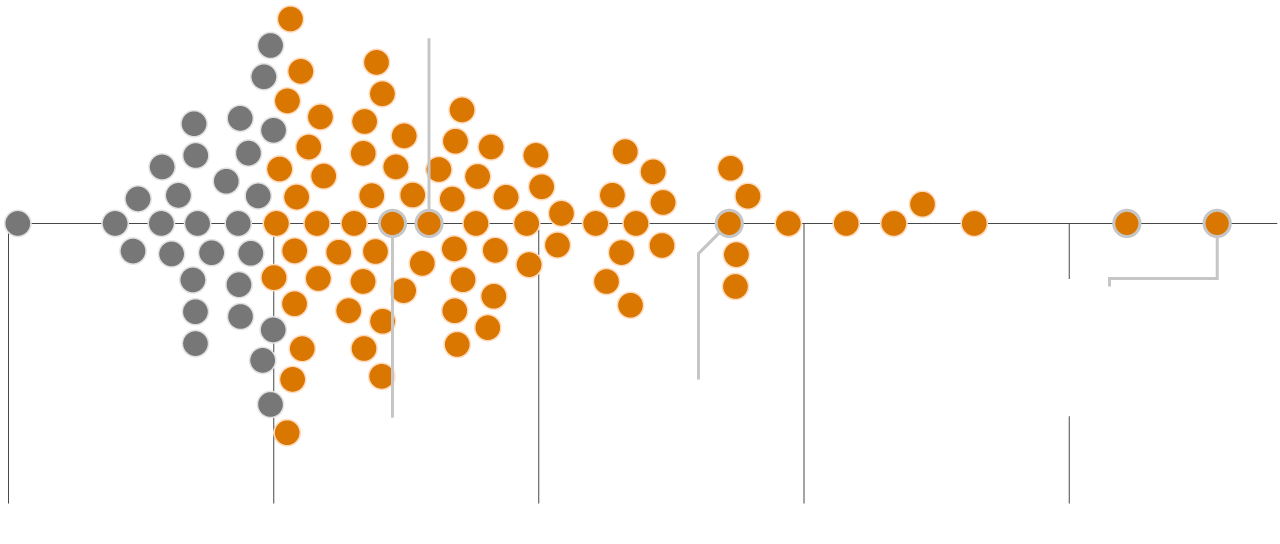Reporting Highlights
- Looking for Recourse: Dad and mom are more and more turning to the grievance course of to get assist for his or her disabled youngsters.
- Unresponsive Districts: When districts break the regulation, the state tells them to repair the issues, however dad and mom say little adjustments.
- Unrealistic Budgets: Idaho faculties use an outdated funding components to pay for particular schooling, and college students with disabilities underperform their friends in different states.
These highlights had been written by the reporters and editors who labored on this story.
Kali Larsen sat at her desk at Fruitland Elementary Faculty in Idaho earlier this 12 months, making an attempt to learn the take a look at questions as her classmates silently labored round her. Her nervousness climbed as she stared on the paper. She requested to make use of the lavatory and left the room.
Her mom, Jessica Larsen, had been substitute instructing that day when she acquired a name from the entrance workplace, notifying her that her 9-year-old daughter was having a panic assault. Kali, now 10, has dyslexia and struggles with studying and writing, Larsen mentioned.
“Wouldn’t you be concerned?” Larsen advised the Idaho Statesman and ProPublica.
For years, Larsen had been pleading with the Fruitland Faculty District to get Kali certified for particular schooling for studying. Larsen, who herself was recognized later in life with dyslexia, had her daughter examined in first grade in 2021 by a personal specialist who mentioned Kali had the identical incapacity. However a analysis doesn’t robotically qualify a scholar for particular schooling. The varsity nonetheless wouldn’t consider Kali for assist, saying she doubtless wouldn’t qualify, partially as a result of her scores weren’t low sufficient, Larsen mentioned.
Larsen grew extra pissed off with every passing college 12 months as her baby — a shy lady who feels most assured when competing in rodeos on her horse, Pie — would cry after college and inform her she felt “dumb.” A 12 months earlier than her daughter’s panic assault in fourth grade, Larsen had filed a state grievance in opposition to the district, saying it refused to judge Kali for particular schooling. Just a few months later, in March 2024, a state investigator agreed: The district had damaged the regulation.
Dad and mom of scholars with disabilities have more and more resorted to submitting complaints with the state over their faculties’ failure to coach their youngsters, alleging districts are violating federal regulation. More often than not, state investigators have agreed and located that districts refuse to determine and consider youngsters with disabilities, reminiscent of dyslexia or autism, and fail to observe plans to coach them pretty.
In Idaho, college students with disabilities have carried out worse in studying and math than lots of their friends in different states, federal knowledge reveals. Idaho was among the many states with probably the most based complaints per capita lately, in response to a nationwide heart that analyzes knowledge on complaints and supplies assist to states. Over the previous 5 years, investigators present in over 70% of the complaints filed in Idaho that districts had damaged the regulation.
However the state typically closes instances with out ensuring the districts have totally solved the issues, dad and mom throughout Idaho advised the Statesman and ProPublica.
Districts can resolve the violations with out “actually altering their methods,” mentioned Amy Martz, a Utah-based lawyer who has labored with households in Idaho. “There’s no tooth.”
State Superintendent Debbie Critchfield mentioned the state Division of Training expects districts to make any corrections wanted to be in full compliance with state and federal regulation, and that it has performed listening periods and piloted different packages to assist meet the wants of scholars and oldsters.
Critchfield mentioned the problem with educating college students with disabilities comes down, partially, to the way in which the state distributes funding, which relies on a flat share and never the precise variety of college students with disabilities in every district. She mentioned workers members have massive caseloads and districts lack skilled workers and specialists.
Dad and mom say it could take months for the districts to judge a baby for companies, and in some instances, districts have refused to supply the instruction or behavioral interventions college students want.
Lawmakers have been reluctant to approve adjustments to the funding components regardless of warnings from state officers a couple of shortfall between what districts spend on particular schooling and what the state allocates. An unbiased oversight workplace this 12 months estimated the hole to be over $80 million. Idaho routinely ranks final within the nation for funding per scholar general.
Larsen mentioned she didn’t need to get the district or lecturers in hassle when she filed her grievance. However she mentioned she risked retaliation, in a small group the place talking out might be damaging, as a result of she supposed to make public faculties higher for her daughter and different youngsters.
“We’re failing our children. That is our future,” Larsen mentioned. “Why are we failing them? And that’s my query to them, however they’ll’t reply.”

Credit score:
Sarah A. Miller/Idaho Statesman
What Investigators Discovered
Faculty districts nationwide are required to determine youngsters who’ve disabilities or well being impairments that might make it tougher to study, reminiscent of attention-deficit/hyperactivity dysfunction or dyslexia, and consider them for particular schooling companies. A dad or mum also can formally request an analysis of their baby. Beneath federal regulation, if the varsity has any cause to suspect a incapacity, it should present that analysis.
However when Larsen requested the district to judge her daughter, the varsity pushed again.
Information present that district officers over a interval of 1 1/2 years offered quite a few causes Kali didn’t want or wouldn’t qualify for particular schooling: Her low studying scores had been primarily as a consequence of nervousness, slightly than a incapacity; she wanted to advocate for herself; she was “making progress”; a particular schooling analysis would take a very long time; if she acquired particular schooling companies, she’d miss out on useful instruction time in a basic schooling classroom.

Credit score:
Sarah A. Miller/Idaho Statesman
Just a few months after Larsen filed her grievance in 2024, an investigator contracted by the state Division of Training concluded that the district didn’t have procedures in place to verify all college students with disabilities had been recognized and helped, and that it hadn’t performed a full analysis of Kali, even after Larsen requested it. The investigators issued a corrective motion plan and ordered the district to start the analysis course of with Kali inside about two weeks and to assist her inside two months in the event that they discovered she certified for particular schooling.
Fruitland Superintendent Stoney Winston, who began in July 2024, after the state issued the corrective motion plan, mentioned the district has “made corrections” and is assembly present necessities. He mentioned he can’t converse to what occurred earlier than he assumed his position.
Incapacity advocates have mentioned the dearth of funding makes it onerous for college districts within the state to draw certified specialists or particular schooling lecturers who totally perceive the regulation, which might result in improper schooling plans or different violations. Excessive caseloads for employees members additionally imply much less time for making or implementing specialised schooling plans, they mentioned.
The state depends on a decades-old funding components that assumes a set share of scholars in each district would qualify for particular schooling: 6% in elementary college and 5.5% in center and highschool. State schooling officers acknowledged these percentages had been by no means ample. Officers mentioned they don’t understand how lawmakers first arrived at that components.
“That 5.5 and that 6%, which was already inadequate again in 2016, is much more inadequate,” mentioned Casey Petti, from Idaho’s Workplace of Efficiency Evaluations, an unbiased oversight company.
In response to the newest knowledge, about 12% of scholars in Idaho qualify for particular schooling companies — the bottom within the nation.
In 2009, that company advised Idaho officers to think about tying particular schooling funding to the precise value of training these college students. In 2016, the workplace got here out with a report with the identical findings.
That very same 12 months, the Legislature created a committee to analysis the difficulty and rewrite the state’s funding components. The committee met for 3 years, and in 2019, lawmakers proposed laws. Whereas these proposals would have offered cash for particular schooling based mostly on the variety of college students really receiving companies, state schooling officers and college directors mentioned they had been unnoticed of the method and the laws can be troublesome to implement. The state superintendent on the time questioned whether or not it might even adequately fund particular schooling.
Within the years since, lawmakers have launched different payments to revise the funding components, however the Legislature didn’t approve any of them. The fee to analyze complaints general has almost tripled for the reason that 2020 college 12 months, in response to the state Division of Training, with every investigation starting from a couple of hundred {dollars} to $30,000.
This 12 months, the Idaho Legislature authorised including one other specialist to assist deal with complaints. Throughout the 2023-24 college 12 months, the state acquired 53 complaints and located districts had been out of compliance in most of them.
However whereas the state has spent extra money to analyze the issues, directors mentioned they’ve been given little to repair them. In Idaho, districts depend on native taxpayers to fund particular schooling greater than in lots of different states, in response to a 2024 examine by Bellwether, a nonprofit that analyzed knowledge from the Nationwide Heart for Training Statistics for the 24 states the place it was accessible.
Boundary County Superintendent Jan Bayer described particular schooling as an “unfunded mandate.” The district spends about $1.7 million from its basic fund to coach college students with disabilities and goes to its taxpayers each two years to ask for added funding to supply different packages.
Different superintendents mentioned it was troublesome to satisfy the wants of each scholar in particular schooling.
“Whereas we offer the overwhelming majority of our college students with the companies they want, we do have a few larger want college students who want extra companies than we will present,” Butte County Superintendent Joe Steele, who retired this summer time, mentioned in an electronic mail to the Statesman. However discovering educators or specialists with the correct coaching, and paying for them, can be difficult within the distant space, he mentioned.
Kendra Scheid watched her son wrestle in a bigger district with excessive caseloads and inexperienced workers. Scheid’s son, who’s autistic and nonverbal, certified for developmental preschool earlier than transferring into the Pocatello-Chubbuck Faculty District in japanese Idaho. However the district advised her that her son might attend preschool solely two days per week for two 1/2 hours every day.
Earlier than her son began attending full-day kindergarten, Scheid requested the varsity for a gathering to place collectively a revised schooling plan for her son. However the district refused, in response to the grievance investigation.
Scheid went to highschool together with her son on the primary days, the place he was positioned with different college students with disabilities, and witnessed what she described as chaos: youngsters climbing on tables, college students injuring themselves with no workers intervention and lecturers restraining youngsters of their chairs. “They’d no concept what any of those youngsters wanted, what any of those youngsters had been like coming into the classroom,” she mentioned.
Pocatello college district spokesperson Courtney Fisher mentioned the district is dedicated to “proactively addressing dad or mum issues” and bettering its particular schooling companies. That features placing into place a plan that meets all state necessities and hiring extra workers, she mentioned, and making an attempt to handle any gaps in its system to stop points sooner or later.
I really feel like a foul mother as a result of I didn’t know these items on the time. And I really feel like I let my son down.
After college on the second day, Scheid’s son got here house crying and protecting his ears, one thing she mentioned he hadn’t accomplished earlier than. After day three, Scheid disenrolled her son from the district. For the remainder of that 12 months, he noticed exterior therapists and Scheid labored with him at house.
After she filed a grievance with the state, an investigator discovered the district had damaged the regulation when it didn’t create a plan that will work for her son and to make sure the trainer had his earlier schooling plan earlier than college began. The state mentioned the district should create a brand new schooling plan for her son ought to he reenroll, however Scheid had misplaced religion. As a substitute, she entered and gained one of many few accessible lottery spots in a constitution college, which her son now attends.
“I really feel like a foul mother as a result of I didn’t know these items on the time,” mirrored Scheid, who mentioned her son is now doing nicely in a constitution college that’s extra accommodating. “And I really feel like I let my son down.”
“I Would By no means Transfer Again There”
About 20% of Idaho districts have damaged federal incapacity regulation a number of occasions up to now 5 years, and almost 40% have violated the regulation a minimum of as soon as, in response to knowledge from the state Division of Training. Once they do, the state, which enforces the federal regulation and corresponding state guidelines, asks them to repair the issues by corrective motion plans.
The plans reviewed by the information retailers ask district workers to endure coaching, and generally a baby will get extra hours of schooling to make up for the time missed. However a Statesman and ProPublica evaluation of corrective motion plans and interviews with dad and mom confirmed districts repeatedly obtain coaching for a similar issues and commit comparable violations.
Critchfield, the state superintendent, mentioned there are a number of components that might play a task in whether or not coaching is profitable for districts completely, together with workers turnover and entry to assets.
“Compliance with state and federal regulation is the final word purpose,” she mentioned in an electronic mail. “As a division, we’re all the time ready to supply remedial coaching and intervention to handle extra issues as they come up.”
The Pocatello college district acquired 11 complaints over the previous 5 years, in response to knowledge from the state Division of Training. The Backyard Valley Faculty District acquired 10. In each of those districts, federal investigators discovered systemic violations in particular schooling regulation that impacted a couple of scholar. The state Division of Training refused to supply the variety of based complaints per district, citing federal regulation on scholar privateness, although another states publicly publish a lot of their grievance investigations on-line.
Andrew Branham was amongst a number of dad and mom who filed complaints in opposition to the Backyard Valley Faculty District over the previous three years.
The Branhams wrote within the grievance that their daughter acquired “just about no schooling” and was denied companies, reminiscent of speech and counseling. At one level, they mentioned a college useful resource officer known as her dad and mom threatening to arrest her. Her dad and mom mentioned they rushed to highschool to search out her barefoot in the midst of the parking zone as a number of adults seemed on. A state investigator concluded that the district in some situations had “relied” on the useful resource officer to handle the scholar’s habits.
Branham mentioned the district was “unwilling” to satisfy the wants of their daughter. The Branhams elevated their case, hiring an lawyer who offered it earlier than a state-contracted listening to officer. The Branhams acquired a monetary settlement with the district and moved to Washington to get their daughter a greater schooling.
“It’s a disgrace what Idaho is doing to youngsters in that state,” Branham mentioned in December. “I’d by no means transfer again there, and I’d by no means suggest anybody stay in that state, particularly in case you have particular wants youngsters.”
After the Branhams filed their grievance and went public, greater than 20 households shared comparable experiences, they mentioned. So that they filed a grievance on behalf of different households that alleged that the district ignored state and federal legal guidelines meant to guard college students with disabilities and denied them an schooling.
The ensuing state investigations concluded that a minimum of 13 of the allegations had been based. The district didn’t correctly assemble schooling plans for college kids. It additionally didn’t have the correct plans for supporting a baby with behavioral points. The district didn’t collect or share the info it wanted to evaluate scholar progress and couldn’t adequately decide whether or not college students had been assembly their studying objectives, the investigations discovered.
The state determined the district wanted further assist, rating Backyard Valley in 2024 as one in every of three districts in want of considerable intervention. The state now requires the district to observe an enchancment plan and screens its progress — however the district’s funding stays the identical.
The Backyard Valley Faculty District didn’t reply to requests for remark.
Households in different districts have additionally pulled their youngsters from native faculties. Some dad and mom and advocates who talked to the Statesman mentioned they’re particularly fearful about President Donald Trump’s efforts to dismantle the U.S. Division of Training and depart it to the states when Idaho has lengthy struggled to supply an schooling to college students with disabilities.
In Kali’s case, the state’s corrective motion plan issued in 2024, along with requiring that the district begin to consider Larsen’s daughter, additionally mandated that the district assist lecturers discover ways to spot college students who must be evaluated for particular schooling and determine these with disabilities.
The state closed the case earlier this 12 months, a couple of 12 months after it was filed. Kali had been struggling with out ample assist for 3 years earlier than the district conceded she was eligible for particular schooling companies.
Kali now has an schooling plan, however Larsen mentioned the district nonetheless isn’t giving her the assistance she wants. She simply completed fourth grade and nonetheless hasn’t mastered studying and writing. As her daughter prepares for center college, Larsen is contemplating pulling her from the district subsequent 12 months. However Larsen doesn’t plan on submitting one other grievance. It was an excessive amount of stress with little to point out for it, she mentioned.
When Kali was moved to a distinct classroom every day to obtain extra specialised instruction, her lecturers generally advised her to sit down and browse quietly, Larsen mentioned.
“She will’t learn,” Larsen mentioned, exasperated. “It’s so irritating.”

Credit score:
Sarah A. Miller/Idaho Statesman







